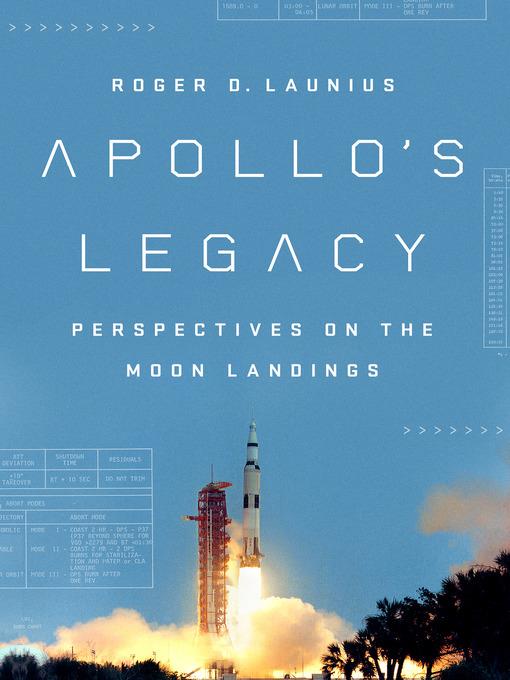
Apollo's Legacy
Perspectives on the Moon Landings
کتاب های مرتبط
- اطلاعات
- نقد و بررسی
- دیدگاه کاربران
نقد و بررسی

March 15, 2019
The former chief historian of NASA examines the history and lasting impact of America's program to reach the moon.Launius (The Smithsonian History of Space Exploration, 2018, etc.) begins with one of the most significant scientific feats of the 20th century, the July 20, 1969, landing of the Apollo 11 astronauts on the moon. After summing up that historic moment, he turns to the ways it has been viewed since: as an awesome achievement in its own right, a waste of valuable resources better used otherwise, an abuse of government power, or even (by a minority) a hoax. The author then examines every phase of the program: creating rockets powerful enough for the job, building the spacecraft and moon lander, and devising the technology to guide and control it--all of which had to be done from scratch. The human component--the astronauts and their support team--receives similar scrutiny, with a focus on how the astronauts were positioned (and marketed) as real-life heroes and how they were received by the public. As for its scientific impact, the program essentially changed our understanding of the moon, while attempts to apply its management principles to more mundane projects--e.g., city management--were less successful. One chapter takes the historian's viewpoint, examining how the many artifacts generated by the program have or haven't been preserved. Especially interesting is a chapter on how the images captured by the astronauts have made an impact on the world, notably the iconic images of the Earth from space. Launius even attempts--without notable success--to figure out why, despite all evidence, some continue to deny that the moon landing occurred. The book also provides extensive background material on the space program, both from within NASA and from outside observers, as well as a useful annotated bibliography for those who want to do their own research.A valuable summary of an important piece of modern history and its effects and a must-read for space enthusiasts.
COPYRIGHT(2019) Kirkus Reviews, ALL RIGHTS RESERVED.

June 1, 2019
Gr 10 Up-Launius, former associate director of collections and curatorial affairs at the Smithsonian National Air and Space Museum and previously chief historian for NASA, presents a nuanced and balanced exploration of the Apollo program and its influence on modern American society, politics, and cultural identity. Each aspect of the program, from Kennedy's announcement and the technology created to the influence of lunar photography, is analyzed from positive and negative reactions at the time, the dominant narrative that emerged, and the fringe viewpoints. Throughout the book, Launius describes references to Apollo found in political cartoons, movies, TV shows, and other media to illustrate the prevalence of the moon landing in popular culture and how the various perceptions of the mission have endured or changed over time. Each chapter is relatively self contained, reading like an essay centered around a theme. If an example is used in more than one chapter, such as the film Apollo 13 in "The Most Powerful Technology Ever Conceived" and "Apollo and the Religion of Spaceflight," brief context is provided. This makes individual chapters suitable for classroom use but makes reading the overall work feel repetitive. Back matter includes notes, an annotated bibliography, and index. VERDICT An excellent resource, recommended for classroom use and most high school libraries.-Kacy Helwick, New Orleans Public Library
Copyright 2019 School Library Journal, LLC Used with permission.

April 15, 2019
Five decades after the Apollo 11 mission, space-flight historian Launius surveys various legacies of the Saturn V-Apollo program. An expensive, complex technological project, its success has inspired advocates for government programs to alleviate one public problem or another, saying, If we can land a man on the moon, we can solve X. But few social or environmental situations are suitable for Apollo-like solutions. Furthermore, only unique Cold War political conditions provided President Kennedy with a rationale for such an endeavor, which, as the 1960s unfolded, attracted criticism from the left (as a diversion of money from social programs) and the right (as a wasteful expansion of government). That Apollo ended underscores its deficiency as an exemplar. Nevertheless, Launius lauds Apollo for achieving JFK's goal of an internationally impressive display of American engineering prowess, generating feelings of patriotic triumph, and satisfying the yearning for heroes. Apollo's images became icons, and it revolutionized scientific understanding of the moon's origin and evolution. Launius' insightful cultural analysis of all that Apollo has signified helps celebrate the first lunar landing's fiftieth anniversary.(Reprinted with permission of Booklist, copyright 2019, American Library Association.)

























دیدگاه کاربران